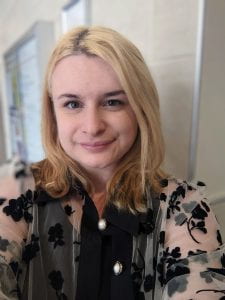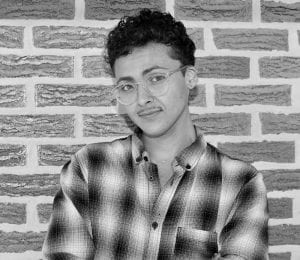Three WGSS PhD candidates – Ashley Barry, Jade Kai, and Galia Cozzi Berrondo – have served as Inclusion, Diversity, Equity, & Access (IDEA) Grads in the College of Arts and Sciences. By taking part in this experiential learning and professional development opportunity, Ashley, Jade, and Galia have been instrumental in enhancing the research and learning environment at Stony Brook and advancing the broader project of social, economic, and environmental justice.
 In Spring 2022, as one of the inaugural IDEA Grads, Ashley Barry worked in the Graduate School with Dr. Miguel Garcia-Diaz and Lisa Ospitale on two projects: adapting the NIH “Becoming a Resilient Scientist” Series for SBU graduate students and creating a survey to measure “wellness” across the SBU graduate student population. They were able to bring their expertise on mental health, and in turn learn a lot about survey methods and the difficulties facing STEM graduate students. Their position as an IDEA grad led to joining the Center of Inclusive Education as a Graduate Assistant, which they have been doing ever since!
In Spring 2022, as one of the inaugural IDEA Grads, Ashley Barry worked in the Graduate School with Dr. Miguel Garcia-Diaz and Lisa Ospitale on two projects: adapting the NIH “Becoming a Resilient Scientist” Series for SBU graduate students and creating a survey to measure “wellness” across the SBU graduate student population. They were able to bring their expertise on mental health, and in turn learn a lot about survey methods and the difficulties facing STEM graduate students. Their position as an IDEA grad led to joining the Center of Inclusive Education as a Graduate Assistant, which they have been doing ever since!
 As an IDEA Grad during the 2022-23 academic year, Jade Kai worked with Dr. Surita Bhatia to develop resource lists and guides that help SBU graduate students and faculty live safe and supported lives both in and outside of academia. For safety in the larger community, Jade created an Online Safety Toolkit with information about online harassment, suggestions for the best ways to respond, and resources for self-care. To help keep safe at school, they crafted a Graduate Student Guide to Mentor/Mentee Relationships that provides mentoring materials and resources for students to know their rights. To promote discussions on race, gender, sexuality, and other issues in hiring and tenure committees, they also developed an informational handout and resource list on Bias in Hiring and Promotion for STEM, the Humanities, and the Social Sciences.
As an IDEA Grad during the 2022-23 academic year, Jade Kai worked with Dr. Surita Bhatia to develop resource lists and guides that help SBU graduate students and faculty live safe and supported lives both in and outside of academia. For safety in the larger community, Jade created an Online Safety Toolkit with information about online harassment, suggestions for the best ways to respond, and resources for self-care. To help keep safe at school, they crafted a Graduate Student Guide to Mentor/Mentee Relationships that provides mentoring materials and resources for students to know their rights. To promote discussions on race, gender, sexuality, and other issues in hiring and tenure committees, they also developed an informational handout and resource list on Bias in Hiring and Promotion for STEM, the Humanities, and the Social Sciences.
 This semester, Galia Cozzi Berrondo will be working closely with Dr. Manisha Desai at the Center for Changing Systems of Power (CCSP) to advance social justice, both within and beyond the academy. Through collaborative intellectual inquiry, CCSP will work on creating cross-disciplinary partnerships with faculty, local and international activists and organizations, as well as the SBU community, to develop research projects that identify, study, and drive change in the root causes of social inequalities. The projects will primarily focus on environmental justice, health disparities, human rights, and carceral studies from an intersectional and transnational feminist perspective. In addition to engaging the SBU community through a CCSP speaker series, one of the center’s first intitiatives will be participating in the Cities for CEDAW campaign, which seeks to “Make the Global Local” by establishing the principles of the convention in Stony Brook and on Long Island.
This semester, Galia Cozzi Berrondo will be working closely with Dr. Manisha Desai at the Center for Changing Systems of Power (CCSP) to advance social justice, both within and beyond the academy. Through collaborative intellectual inquiry, CCSP will work on creating cross-disciplinary partnerships with faculty, local and international activists and organizations, as well as the SBU community, to develop research projects that identify, study, and drive change in the root causes of social inequalities. The projects will primarily focus on environmental justice, health disparities, human rights, and carceral studies from an intersectional and transnational feminist perspective. In addition to engaging the SBU community through a CCSP speaker series, one of the center’s first intitiatives will be participating in the Cities for CEDAW campaign, which seeks to “Make the Global Local” by establishing the principles of the convention in Stony Brook and on Long Island.
